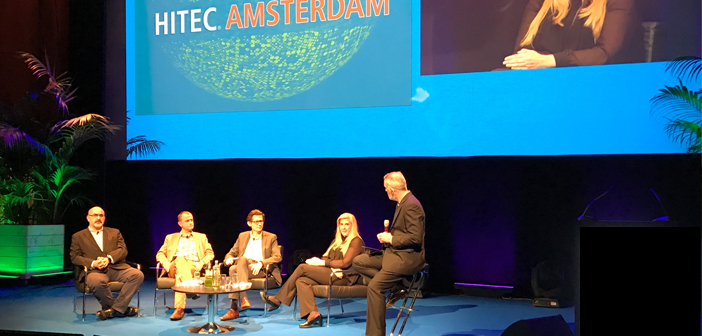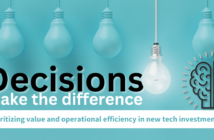Takeaways from HITEC Amsterdam demonstrate that IT professionals need to be better integrated in hospitality strategic planning.
By Eliza Selig
The digital age has been transforming to the hospitality industry, as it impacts guest interaction at almost every step, and has given rise to the central role the IT department plays in guest-facing and back-of-the-house operations. Today, an effective CIO does not solely act as an engineer, but also needs to establish inter-departmental partnerships to ensure the success of technology projects that touch every corner of the hospitality environment. And while the sensational personalization coming from the vast stores of collected data present a warm welcome to our guests, it has also placed a heavy security burden on our IT management.
The digital age is now rushing in and how to navigate it was the primary topic of discussion at the inaugural HITEC Amsterdam, March 29–30, 2017, produced by Hospitality Financial and Technology Professionals (HFTP®).
The HITEC Amsterdam education program was developed by a council of industry experts who planned topics that had universal appeal, while also inserting topics with a European perspective. That perspective came largely from expert presenters, many of whom oversee IT operations from EU-based properties and companies. Having the opportunity to attend a number of these sessions, I highlighted some of the interesting discussions with a focus on the prominence of technology in the hospitality business.
Impact of Mobile on Today’s Travelers
To start, a picture was drawn of today’s traveler and how the experience is assisted by the digital devices the traveler carries. This was presented in the opening keynote given by psychologist Dr. Alex Krotoski, an award-winning international broadcaster, author and academic who is behind the BBC Radio 4 show The Digital Human and BBC World’s The Virtual Revolution. She pinpointed current disrupters that are impacting how people travel.
Dr. Krotoski, who presented her talk from a psychologist’s viewpoint, began with an observation that previous to the time of online connections, vacationers traveled in groups defined by geography or nationality. Tourists followed the guides popular among their countrymen, and you could easily find Germans in a restaurant that was highlighted in travel literature found in Germany (and the same for the French, Americans and so on). Now, with the ability to connect across borders via online groups, travelers move in communities of practice. People seek out others with like-minded interests and seek out experiences centered on these. Because of this she said, “It is these groups that will have a greater influence on how people navigate the world of travel. How they navigate the world full-stop: Where people choose to go on holiday, where people choose to go for work.”
The next great travel disruptor is the mobile phone, which changes the way we approach travel. “The combination of connectivity and contact have made the phone the great travel disruptor,” Krotoski said. Previously, much time was spent on planning and research before reaching your destination. Now, you can arrive and quickly be matched to restaurants and sites that align with your sensibilities based on your search history. The phone has also become an extension of ourselves, and constant connectivity is imperative to many.
So, the challenge to hoteliers is how to deal with guests who never get off Twitter and other social media sites. Krotoski suggested that it shouldn’t be about defeating the mobile phone, but coexisting with it. As an example, she described how there are restaurants in Singapore that offered beautifully arranged plates of food to its customers for them to capture and post to their Instagram accounts before actually serving the meal to customers.
Today’s CIO
Later in the afternoon, the program provided a revealing CIO panel discussion. The session was moderated by HITEC Amsterdam Chair Carson Booth, CHTP, who asked a series of questions on the modern role of the CIO. Panelists included Marco Correia, head of IT at Belmond; Timo Kettern, IT director at Lapithus Hotel Management; Phil LeBrun, vice president of global technology development at McDonald’s Corp.; and Nancy Wolff, vice president of hotel systems at Jumeriah Group.
Technology is now intricately woven into almost every aspect of our business, and those who oversee it have big responsibilities. Because of this, our panelists were asked what kept them up at night. No surprise, security was the top response. In fact, Correia, whose Belmond is a publicly traded company, said that data security is a standing agenda item at board meetings.
Additional concerns related to properly built infrastructure. Wolff is troubled by the lack of attention towards data architecture. She explained, while attention is paid to system architecture, data architecture is overlooked, which eventually causes inefficiencies. LeBrun is now placing focus on the robustness of systems. He explained that spending should not be concentrated in implementing the new and innovative, but making systems reliable, because if they fail, the business is put on hold.
Regulations on Data Collection
In the descriptions above, much discussion surrounded the integration of technology in all facets of the hospitality business. Along with the flashiness and efficiency that these features bring, the digital age has also brought in the responsibility of data management. Currently in the United States, regulation of PII (personally identifiable information) is becoming lax; while on the opposite end, the EU is becoming more stringent with the newly released General Data Protection Regulation (GDPR). Effective May 28, 2018, the implementation will impact not only businesses in the EU, but any business that collects PII from an EU citizen. Noncompliance carries a tiered fine approach, with up to 4 percent of annual global turnover as the max. This was a high priority topic at HITEC Amsterdam, and Jose Medio, CIPP/US, CIPP/E, managing director at Privalis Group, provided a basic overview of what would be required under the regulation.
Medio explained the GDPR is directly applicable to the 27 EU member states; and as mentioned before, to any companies outside of the EU that offer goods or services to EU citizens. This point is a primary tenet to the regulation and clarity on its territorial scope is a key change. To monitor activity, there is one data-protection authority responsible for the supervision of cross-border data processing operations carried out by a company.
Much is notable and new in the regulation. One item is consent, where request for consent must be in a concise presentation (vs. a long form of legal jargon) with the purpose for data collection clearly stated. Data subjects, the individuals whose data is collected, have extensive rights that include mandatory breach notifications, right to have data completely removed from all storage, right to move your own data from one entity to another, and also processors must design privacy in their systems from the onset and not as an afterthought.
To manage this protection, entities must now appoint a Data Protection Officer (DPO). This requirement is estimated to potentially open up 28,000 new positions. The DPO, who acts independently, will be the guardian of GDPR compliance within a company, advising on what is required for compliance, assisting with training and policy making, and will consult and cooperate with the supervisory authority.
At the completion of this inaugural event, positive feedback was given and, overall, there was consensus on the importance of a Eurocentric hospitality technology event. HFTP came away with plans for a second HITEC Amsterdam, April 11-13, 2018; and has put together a council to develop guidelines for a hospitality DPO to help hospitality companies prepare for next year’s deadline.
As a traveler, I became innately aware of my digital persona and how it will lead me on my future adventures. ■
Eliza Selig is HFTP director of Communications, where she oversees the association’s publications and news distribution. Learn more about HFTP and HITEC at www.hftp.org.




